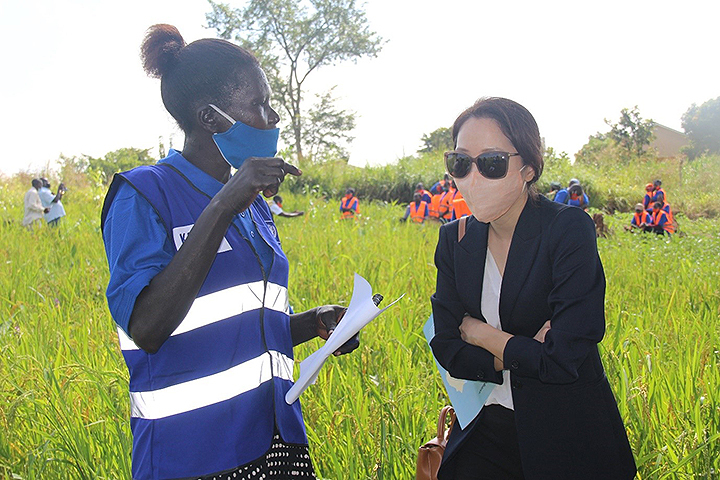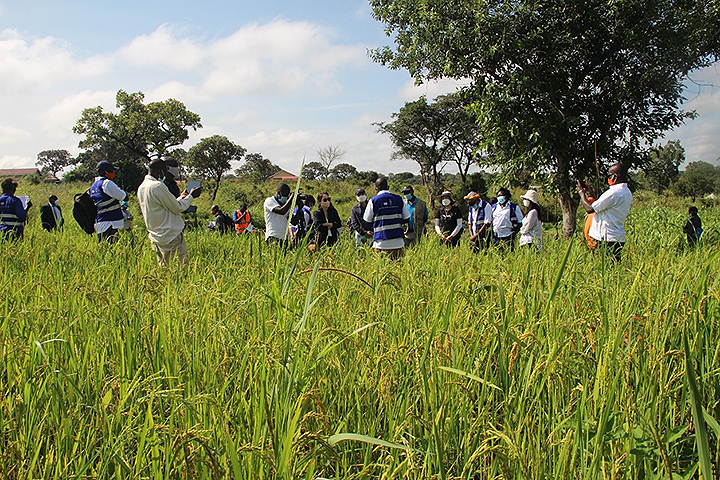UNDP, Korea boost refugee livelihood through cash for work project
Food insecurity remains a big challenge for the vulnerable households in and around the refugee settlements.
It is a sunny day in Adjumani district, and Angeline Foine is winnowing beans. The 57-year-old is a refugee from South Sudan living in Bidi Bidi refugee camp.
Foine is one of the refugees, that are struggling to make ends meet, following the outbreak of the coronavirus pandemic that left many refugees as well as host communities hit hard as food rations were reduced escalating the already existing hitches.
According to Foine who is a widow, getting enough food to feed her family of 10 dependents is a very big challenge.
Food insecurity remains a big challenge for the vulnerable households in and around the refugee settlements.
However, this challenge is being addressed through a United Nations Development Programme (UNDP) and Korea International Cooperation Agency (KOICA) project called "Uganda Host and Refugee Community Empowerment project"

The 4-year project worth $9 million (about sh33 billion) is aimed at improving the well-being of refugees and host communities in Acholi and West Nile sub-regions.
Through the project running from 2019-2022 beneficiaries get cash for work activities to grow different crops (Rice, Yams, Sim-sim, Cassava, Maize, Soya-beans, Pigeon peas, beans and Onions).
This is helping refugees like Foine to become food secure as well as improve nutritional values and increasing on the incomes of over 2,700 refugees and members of the host communities.
"I'm able to get food, and money and other basic needs from my cash for work block garden," Foine says.
Isaac Vicky Keji, 44-year-old a South Sudanese refugee, also a mother of five, reveals that through cash for work program, she has been able to open up a shop where she now sells sugar, salt and soap.
"I'm able to provide basic needs for my family, which was difficult before the project," Keji says.
Uganda has witnessed large numbers of refugees entering the country for decades because of its open-door policy to refugees.
Although refugees feel safe living in Uganda, many live in abject poverty.
The country is currently home to over 1.4 million refugees largely from DR Congo and South Sudan.
This has put pressure on natural resources such as fuelwood, building materials, fresh water and food causing food insecurity and environmental degradation in host communities.
Findings of the baseline study conducted by Save the Children in June 2020 under the Uganda Host and Refugee community Empowerment project, showed that food insecurity remains a big challenge for the vulnerable households in and around the refugee settlements.
The study reveals severe acute food insecurity among the household, many resorting to rationing (49% refugees, 51% host) on daily basis to manage the shortfall of food in order to prolong the small amount of food in their house.

Recently, the Republic of Korea in Uganda and UNDP Uganda jointly monitored and assessed the progress of the project in Adjumani district with the objective to interact and discuss with relevant stakeholders at the sub-national level including beneficiaries about the development impact and synergies the project has created.
According to the UNDP Uganda's project manager of Uganda's Host and Refugee Community Empowerment project, Raymond Mukisa, about 7200 direct and 36,000 indirect refugees and host communities are to benefit from the project by 2022.
Speaking during the monitoring mission of the project, the Resident District Commissioner (RDC) Taban Data Peter noted that the project was timely as COVID-19 came into existence.
Because of the project, harmony between refugees and host communities has been promoted since both parties are involved in cash for work activities.
"The project has created unity among refugees, increased sustainability regarding food and provided agricultural skills to host communities and refugees," Data says.
The Madi Paramount Chief, Stephen Drani commended the support given to refugees and pledged to provide more land to refugees.
"Giving land is about saving life, children and women who have nowhere to stay. We shall continue to take such decisions for the benefit of humanity." Drani says.
He urged refugees to involve themselves in the Agricultural sector.
According to the Head of Development Cooperation, Republic of Korea, Kim Ah Young, the embassy will continue working in collaboration with all stakeholders to achieve the objectives of the project.
On behalf of the UNDP in Uganda, the Peace, Security and Systems Resilience team leader, Francesca Akello committed to working closely with cultural leaders and other relevant stakeholders to ensure that livelihoods of refugees and host communities are improved.
She thanked the host communities for their generosity.